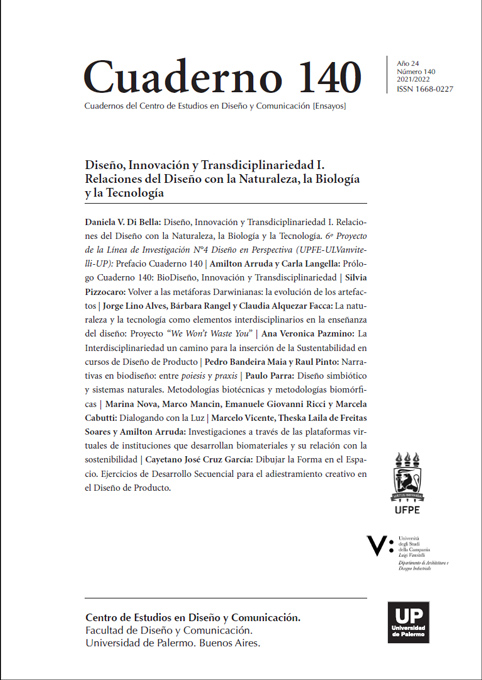La naturaleza y la tecnología como elementos interdisciplinarios en la enseñanza del diseño: Proyecto “We Won’t Waste You” Nature and technology as interdisciplinary elements in teaching design: Project “We Won’t Waste You”
Abstract
This paper presents the interdisciplinary project “We Won’t Waste You” developed in the Master’s Program of Product and Industrial Design, University of Porto, Portugal, in partnership with the Municipality of Matosinhos. Based on the principles of interdisciplinarity, on Project-Based Learning and on Material Driven Design methodology, students developed products using discarded materials (crustacean shells, charcoal ash, scales, egg shells, etc.) in two different contexts: nature that is capable of supplying incredibly interesting raw materials and often ready and suitable for use and application in new products, and the catering industry that generates a large amount of discarded waste that can be reused for new purposes.
References
Alves, J. L.; Facca, C. A.; Fernandes, A. P.; Rangel, B., & Barbosa, A. M. (may de 2020). Interdisciplinaridade entre Design e Engenharia: Novas Competências no Ensino de Projetospara a Inovação Circular. Cuaderno 114 - Centro de Estudios en Diseño y Comunicación, pp. 179-203.
Brassler, M., & Dettmers, J. (2017, 07 31). How to Enhance Interdisciplinary Competence— Interdisciplinary Problem-Based Learning versus Interdisciplinary Project-Based Learning. Interdisciplinary Journal of Problem-Based Learning, 11(Article 12), p. 15. Retrieved dezembro 07, 2019, from https://doi.org/10.7771/1541-5015.1686
Facca, C. A. (2020). A contribuição do pensamento do design na formação do engenheiro: o espaço do Fab Lab como experiência transversal. Tese de Doutorado, Universidade Anhembi Morumbi, PPG Design, São Paulo.
Facca, C. A.; Alves, J. L., & Barbosa, A. M. (2019a). Overview of Design Teaching on Engineering Courses: A Comparative Study between Brazil and Portugal. In W. -W. Science (Ed.), International Conference on Education and New Developments, (pp. 129-133). Porto.
Fernandes, A. P. (2019). Formando designers para a inovação sustentável: Aprendizagem baseada em projetos para conectar estudantes à sociedade e ao meio ambiente através do design. Dissertação, Universidade do Porto, Mestrado em Design Industrial e de Produto, Porto.
Fernandes, A.; Cardoso, A.; Sousa, A.; Buttunoi, C.; Silva, G.; Cardoso, J.; . . . Alves, J. L. (2018). We Won’t Waste You, Design for Social Inclusion Project Based Learning methodology to connect the students to the society and the environment through innovation. 3rd International Conference of the Portuguese Society for Engineering Education (CISPEE), (pp. 1-10). Aveiro (Portugal). doi:10.1109/CISPEE.2018.8593425
Fernandes, A.; Facca, C. A.; Alves, J. L.; Rangel, B.; Leite, R.; Neto, B., & Barbosa, A. M. (2020). Sustainability as a theme of interdisciplinarity between design and engineering courses. IEE EDUCON - Global Engineering Education 2020. Porto.
Friedman, K. (2019). Design Education Today: Challenges, Opportunities, Failures. Chatterjee Global Lecture - Ullman School of Design - College of Design, Architecture, Art and Planning - University of Cincinnati, (p. 104). Cincinnati, Ohio (USA). Retrieved Apr. 17, 2021, from https://www.academia.edu/40519668/Friedman_2019_Design_Education_Today_Challenges_Opportunities_Failures
Gomes, D.; Figueiredo, G., & Assunção, J. (2020/2021). Projeto Gris. Faculdade de Engenharia da Universidade do Porto (FEUP), Mestrado de Design Industrial e de Produto.
Grant, M. M. (2002). Getting a Grip on Project-Based Learning: Theory, Cases and Recommendations. Meridian: A Middle School Computer Technologies Journal, 5(Issue 1), p. 17. Obtido em 07 de dezembro de 2019, de http://www.ncsu.edu/meridian/win2002/514/3.html
Guevara, A. J., & Fazenda, I. C. (2013, March 23). A sustentabilidade é a causa; a interdisciplinaridade, o caminho. Revista Pátio-EM16, 5. Retrieved April 17, 2021, from https://ken.pucsp.br/interdisciplinaridade/article/download/16789/12550
Karana, E.; Barati, B.; Rognoli, V., & Laan, A. Z. (2015, August 31). Material Driven Design (MDD): A Method to Design for Material Experiences. International Journal of Design, 9(2), pp. 35-54. Retrieved April 18, 2021, from http://www.ijdesign.org/index.php/IJDesign/article/view/1965
Krajcik, J. S., & Blumenfeld, P. C. (2006). Project-Based Learning. Em R. K. Sawyer (Ed.), The Cambridge Handbook of the Learning Sciences (pp. 317-333). New York, NY: Cambridge University Press. Obtido em 07 de dezembro de 2019, de http://interchange.education/sites/default/files/The%20Cambridge%20Handbook%20of%20the%20Learning%20Sciences_0.pdf
Leal, D.; Alves, J. L.; Fernandes, A., & Rangel, B. (2020). We Won’t Waste You: A research project to introduce waste and social sustainability in design thinking. IEEE Global Engineering Education Conference (EDUCON), (pp. 1959-1963). Porto (Portugal). doi:10.1109/EDUCON45650.2020.9125180.
Meyer, M. W., & Norman, D. (2020, Spring). Changing Design Education for the 21st Century. she ji - The Journal of Design, Economics, and Innovation, 6, p. 37. doi: https://doi.org/10.1016/j.sheji.2019.12.002
OECD. (2018). Oslo Manual 2018: Guidelines for Collecting, Reporting and Using Data on Innovation 4th Edition. Organisation for Economic Co-operation and Development -
OECD/Eurostat. Luxembourg: OECD Publishing, Paris/Eurostat. Retrieved oct. 05, 2019, from https://doi.org/10.1787/9789264304604-en
Oliveira, B.; Oliveira, G.; Torres, L., & Pêgo, P. (2020/2021). Re-Birth Collection. Faculdade de Engenharia da Universidade do Porto (FEUP), Mestrado de Design Industrial e de Produto.
Pombo, O. (2004). Epistemologia da Interdisciplinaridade. Em P. C. Pimenta, Interdisciplinaridade, Humanismo, Universidade (p. 235). Porto: Campo das Letras.
Sá, A.; Batista, B.; Catarina, Barbosa, & Pinto, C. (2020/2021). Projeto Conchatura. Faculdade de Engenharia da Universidade do Porto (FEUP), Mestrado de Design Industrial e de Produto.
United Nations. (2020). The Sustainable Development Goals Report. New York, NY (USA): United Nations Publications. Retrieved Apr. 17, 2021, from https://unstats.un.org/sdgs/report/2020/
WDO. (2020). Definition of Industrial Design. Retrieved outubro 12, 2019, from WDO - World Design Organisation: https://wdo.org/about/definition/
WWF. (2020). Living Planet Report 2020 - Bending the curve of biodiversity loss. Almond, R.E.A.; Grooten, M.; Petersen, T. Gland, Switzerland: WWF ; - World Wildlife Fund. Retrieved apr. 17, 2021, from https://livingplanet.panda.org/pt-br/about-the-livingplanet-report
Los autores/as que publiquen en esta revista ceden los derechos de autor y de publicación a "Cuadernos del Centro de Estudios de Diseño y Comunicación", Aceptando el registro de su trabajo bajo una licencia de atribución de Creative Commons, que permite a terceros utilizar lo publicado siempre que de el crédito pertinente a los autores y a esta revista.


